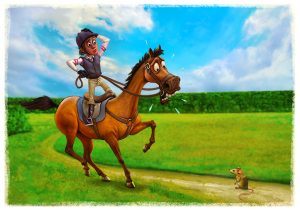Spring Grass and Horse Behaviour
 Does your horse become more flighty, hot and silly in Spring? With new grass growth and return to training after the winter break, many horse owners complain that their horse is too fresh, anxious or nervous during this time. This behaviour is often called ‘Spring Fever’.
Does your horse become more flighty, hot and silly in Spring? With new grass growth and return to training after the winter break, many horse owners complain that their horse is too fresh, anxious or nervous during this time. This behaviour is often called ‘Spring Fever’.
Sugary, Fructan Rich Grass
Spring is the season when grass starts to grow more quickly again after the slow winter months. That first flush of grass, especially after some rain, can be loaded with simple sugars to fuel quick growth of new pasture. However, this high sugar content increases the energy level of the pasture grazed, giving your horse a sugar hit! A higher proportion of the sugars are also available as fructans in spring, which as a hindgut-fermented sugar, contributes to hot, fizzy behaviour and also laminitis in overweight or sugar-sensitive horses and ponies.
Magnesium Deficiency causing Spring Fever
Another leading cause of nervous and anxious behaviour, or Spring Fever, is the content of potassium in Spring grass. Potassium is a mineral salt which absorbs in the same sites in the small intestine that other minerals, such as calcium, iron, phosphorus and magnesium, are also shuttled through digestive processes to enable usage or storage in the body. Grass that is growing rapidly has a higher level of potassium, especially in spring, which can affect the balance of minerals absorbed and available for use. Excess potassium is known to reduce the absorption of magnesium, a mineral which is used in many different body systems in the horse, especially in muscles and nerves. Much of this information comes from bovine research, where the problem of magnesium deficiency is termed grass tetany and can lead to nerve disorders, convulsions and even death. However, there is a lot of evidence that horses are affected by the same competition between potassium and magnesium absorption, even though they are not as susceptible to serious magnesium deficiency. A subclinical or mild magnesium deficiency can often affect behaviour as a first symptom, leading to an increase in anxiety and nervousness in horses which are usually calm and steady. Many horse owners and trainers term this change in behaviour often exhibited in horses as “Spring Fever”.
Magnesium for Spring Fever
Adding a supplement of magnesium can replenish levels in the blood, muscle cells and nerves, helping to calm excitable nerve impulses and reduce anxious or over-reactive behaviour. However, with the potassium from Spring grass still interfering with its uptake, you need to add a lot of extra magnesium to ‘out-compete’ potassium, which can easily overbalance the diet if you choose magnesium oxide, chloride or sulfate (Epsom salts). A smarter way to increase magnesium uptake is by activating a better route of absorption and utilisation in the digestive system. Magnesium that is covered by a protein coat (termed an organic chelate) helps absorption because it can bypass the busy mineral absorption system overloaded by processing potassium, calcium and phosphorus. Thus, magnesium proteinate has a more efficient uptake and higher ‘bioavailability’ than regular mineral magnesium. With less competition from excess potassium, this protein-bound chelate is much more effective at optimising magnesium absorption to calm nerve and muscle issues such as Spring Fever, even though it contains much less magnesium per dose!
Kohnke’s Own Mag-E for horses with Spring Fever
Kohnke’s Own Mag-E features this special top quality organic magnesium chelate, as a protein-bound form with better bioavailability and more efficient uptake compared to regular mineral magnesium. Mag-E is a superior choice for naturally helping your horse become calm and focused, as it has less magnesium than other calmers, but has a much better effect! Mag-E also includes a source of supplementary thiamine (vitamin B1) for extra calming action and high potency, high quality vitamin E for normal nerve and muscle function. The base of Mag-E contains stomach calming yeasts for horses which experience a tense and troubled tummy during stressful situations, often during travelling and waiting to compete in new surroundings. Horse owners around Australia trust Mag-E as a supplement to help calm and focus their horse, whether a pleasure riding pony or an equine athlete competing at the highest levels of equestrian sports or even racing. Mag-E is trusted for its reliable, effective result and easy, flexible dosage for all horses. Mag-E does not swab or reduce performance. References: Stewart, A. J. (2011). Magnesium disorders in horses. Veterinary Clinics of North America: Equine Practice, 27(1), 149-163. Martens, H., & Rayssiguier, Y. (1980). Magnesium metabolism and hypomagnesaemia. In Digestive physiology and metabolism in ruminants (pp. 447-466). Springer Netherlands. Martens, H., & Schweigel, M. (2000). Pathophysiology of grass tetany and other hypomagnesemias: implications for clinical management. Veterinary Clinics of North America: Food Animal Practice, 16(2), 339-368.
